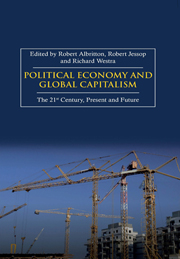Book contents
- Frontmatter
- Contents
- List of Abbreviations
- Notes on Contributors
- Introduction: Political Economy and Global Capitalism
- Part 1 Political Economy of the Present
- Part 2 Political Economy of a Progressive Global Future
- Introduction
- 6 Volatile, Uneven and Combined Capitalism
- 7 The Erosion of Non-Capitalist Institutions and the Reproduction of Capitalism
- 8 The Transformative Moment
- 9 Frontiers of Cadre Radicalization in Contemporary Capitalism
- 10 Green Marxism and the Institutional Structure of a Global Socialist Future
- Index
10 - Green Marxism and the Institutional Structure of a Global Socialist Future
from Part 2 - Political Economy of a Progressive Global Future
Published online by Cambridge University Press: 05 March 2012
- Frontmatter
- Contents
- List of Abbreviations
- Notes on Contributors
- Introduction: Political Economy and Global Capitalism
- Part 1 Political Economy of the Present
- Part 2 Political Economy of a Progressive Global Future
- Introduction
- 6 Volatile, Uneven and Combined Capitalism
- 7 The Erosion of Non-Capitalist Institutions and the Reproduction of Capitalism
- 8 The Transformative Moment
- 9 Frontiers of Cadre Radicalization in Contemporary Capitalism
- 10 Green Marxism and the Institutional Structure of a Global Socialist Future
- Index
Summary
Introduction
The green challenge to Marx's socialist vision for its purported commitment to industrial giganticism and the fact that a green politics has emerged as a focal point for oppositions to the current world order has spurred Marxists to reconsider the theory and practice of socialism in a green light. The present chapter follows in the spirit of that work intent upon defending the potency of Marxist theory – particularly Marxian economics – to expose the roots and modalities of the eco-destructive tendencies of capitalism. And, this work shares in the belief that it is only through the building of a genuine socialism that an eco-sustainable global future for humanity can be realized. However, the chapter maintains the case Marxism makes regarding such paramount questions needs to be strengthened and that there exists a latent power of Marxian analysis waiting to be tapped for precisely this purpose.
Marx's Capital has been successfully mined for its elucidation of the class-exploitative, crises-ridden, lop-sided wealth-concentrative nature of capitalism. But only marginally has it been explicitly drawn upon for its exploration of how it is possible for such a society – what Marx referred to variously as an ‘upside-down’, ‘alien’, ‘fetishistic’ social order reducing human socio-economic relations to ‘relations among things’ – to reproduce human economic life over an extended period in the first place.
- Type
- Chapter
- Information
- Political Economy and Global CapitalismThe 21st Century, Present and Future, pp. 219 - 236Publisher: Anthem PressPrint publication year: 2007
- 1
- Cited by

